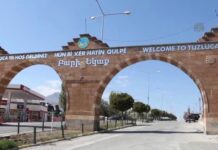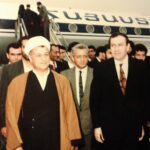WikiLeaks-Armenia No 55
2007-02-22
C O N F I D E N T I A L SECTION 01 OF 02 YEREVAN 000186
SUBJECT: DASD MACDOUGALL’S MEETING WITH DEFMIN SARGSIAN, OUTGOING DEPUTY DEFMIN AGHABEKIAN
Classified By: CDA A. F. Godfrey for reasons 1.4 (b, d).
——-
SUMMARY
——-
¶1. (C) During a February 16 meeting with Armenian Defense Minister Sargsian, Deputy Assistant Secretary of Defense Jim MacDougall praised Armenia’s progress in defense reform, thanked Armenia for its contribution to coalition operations in Iraq, and encouraged Sargsian to consider sending a contingent to join operations in Afghanistan. He also expressed concern about regional stability, and cautioned strongly against engaging in what seemed to be a competitive arms buildup in the region. Sargsian pledged to continue Armenia’s contribution to international coalitions, but was pessimistic about near-term prospects for positive change in the security outlook in the South Caucasus. However, he expressed appreciation for the efforts of the OSCE Minsk Group to seek resolution to the conflict in Nagorno Karabakh.
END SUMMARY.
¶2. (C) Sargsian thanked DASD MacDougall for the United States’ continued partnership with the GOAM. He said that several years ago, no one would have believed that the current level of U.S.-Armenian military cooperation were possible. Sargsian also expressed confidence the MOD [Ministry of Defense] would continue with the significant reforms already in progress, ultimately improving the quality of the Armenian armed forces. He commented on the service of the Armenian contingent in Iraq and his own Iraq visit in November 2006. Sargsian reiterated a point he had made to our DATT during the return trip from Iraq, stating that it is not possible to understand fully the situation in Iraq without actually spending time on the ground. (NOTE: During that trip, he told DATT the visit had crystallized for him the need to have as professional and capable a force as possible. END NOTE.) Sargsian mentioned that although the Armenian contingent in Iraq was small, the mission was a very important one for the government of Armenia.
¶3. (C) Sargsian did not seem optimistic when DASD MacDougall asked about developments in the South Caucasus. He said the region was no more secure than it had been a few years earlier, and that, despite increased efforts of Western countries and the OSCE Minsk Group to mediate conflict with Azerbaijan, the military threat was still very real. He also said he did not expect to see open borders with Turkey in the near future.
———-
ON GEORGIA
———-
¶4. (C) On Georgia, Sargsian expressed regret that Armenia had not been able to increase its military cooperation with its northern neighbor in the last three years, commenting that countries, military cooperation lessens the potential for conflict between them. Sargsian said that while Georgia and Armenia were natural allies, Georgia’s current security challenges and its cooperation with Turkey and Azerbaijan require it to make decisions that aren’t beneficial to Armenia. He said he realized the GOG’s decisions were not an attempt to poke Armenia in the eye, but that were made for the benefit of Georgia’s prosperity and national security. (NOTE: This was a reference to Georgia’s decision to go ahead with the Kars-Alkhalkalaki-Baku railway. Foreign Minister Oskanian made very similar comments in the press earlier in the month. END NOTE.)
———-
ARMS RACE?
———-
¶5. (C) Sargsian also commented on the conflict in N-K and the ongoing acquisition of weapons systems by both sides. He said Azerbaijan saw Armenia’s desire to resolve the conflict peacefully as a sign of weakness, prompting it to step up its war rhetoric and weapons procurement. Sargsian argued that Armenia’s procurements are direct responses to Azerbaijani acquisitions, and are wholly defensive. As an example, he said Armenia responded to Azerbaijan’s 2006 purchase of 14 MIG-29 fighters by procuring additional air defense capability. He noted that while Azerbaijan had purchased more than 150 tanks in 2006, Armenia’s existing anti-tank weapons arsenal was sufficient to address that threat.
———————-
ON MILITARY ASSISTANCE
———————-
¶6. (C) Sargsian said he hoped the U.S. would maintain parity in its military assistance to Armenia and Azerbaijan, but noted that no one in the government believed the U.S. sided with Azerbaijan over Armenia. He said overall U.S. assistance to Armenia helps to balance the assistance Azerbaijan receives from Russia and Islamic countries. Sargsian noted that Russia gave Azerbaijan 63 tanks in 2003, but gave none to Armenia, and that while Ukraine provides no military assistance to Armenia, it had transferred 62 tanks to Azerbaijan – about two battalions’ worth.
————————–
DASD MEETS WITH AGHABEKIAN
————————–
¶7. (C) DASD MacDougall also met with Aghabekian, who was upbeat and optimistic as he prepared to leave his post to pursue his political goals (reftel). Aghabekian expressed satisfaction with U.S. military assistance to Armenia, and said that now it was Armenia’s turn to use its acquistions to benefit international operations. He said Armenia had trained personnel ready for deployment to Afghanistan, but noted he was not sure whether the GOAM [Government of Armenia] was willing to take that step. DASD MacDougall took that opportunity to note that NATO forces were expecting a spring Taliban offensive, and that with the extension of several thousand troops in Afghanistan, an Armenian contribution would be much-appreciated. Aghabekian said the military planned a full EMEDS deployment exercise for the summer, and that all personnel would be trained on the hospital by fall, though he said he did not know whether EMEDs would be ready to deploy then.
——-
COMMENT
——-
¶8. (C) Sargsian is perfectly correct in his comment that the level of defense cooperaton we enjoy today is sharply different from the arms-length attitude that we experienced from the MOD two or three years ago. What remains to be seen is whether that positive working relationship — and momentum on IPAP goals and defense sector reform–will be sustained during the months of leadership vacuum that now seems poised to descend on the ministry. Aghabekian — a key driving force in the accomplishment of IPAP goals — has already left the Ministry to campaign for his ARF-Dashnaktsutyun party. Meanwhile, Sargsian is not far behind, planning an extended leave of absence (at least through the May 2007 election) to work on his own Republican Party campaign work. It is not clear who will be left minding the store at MOD. The most obvious candidates are neither visionary thinkers nor political heavyweights, and are tepid at best in their enthusiasm for Euro-Atlanticism.
¶9. (U) DASD MacDougall did not have the opportunity to clear on this telegram. GODFREY












